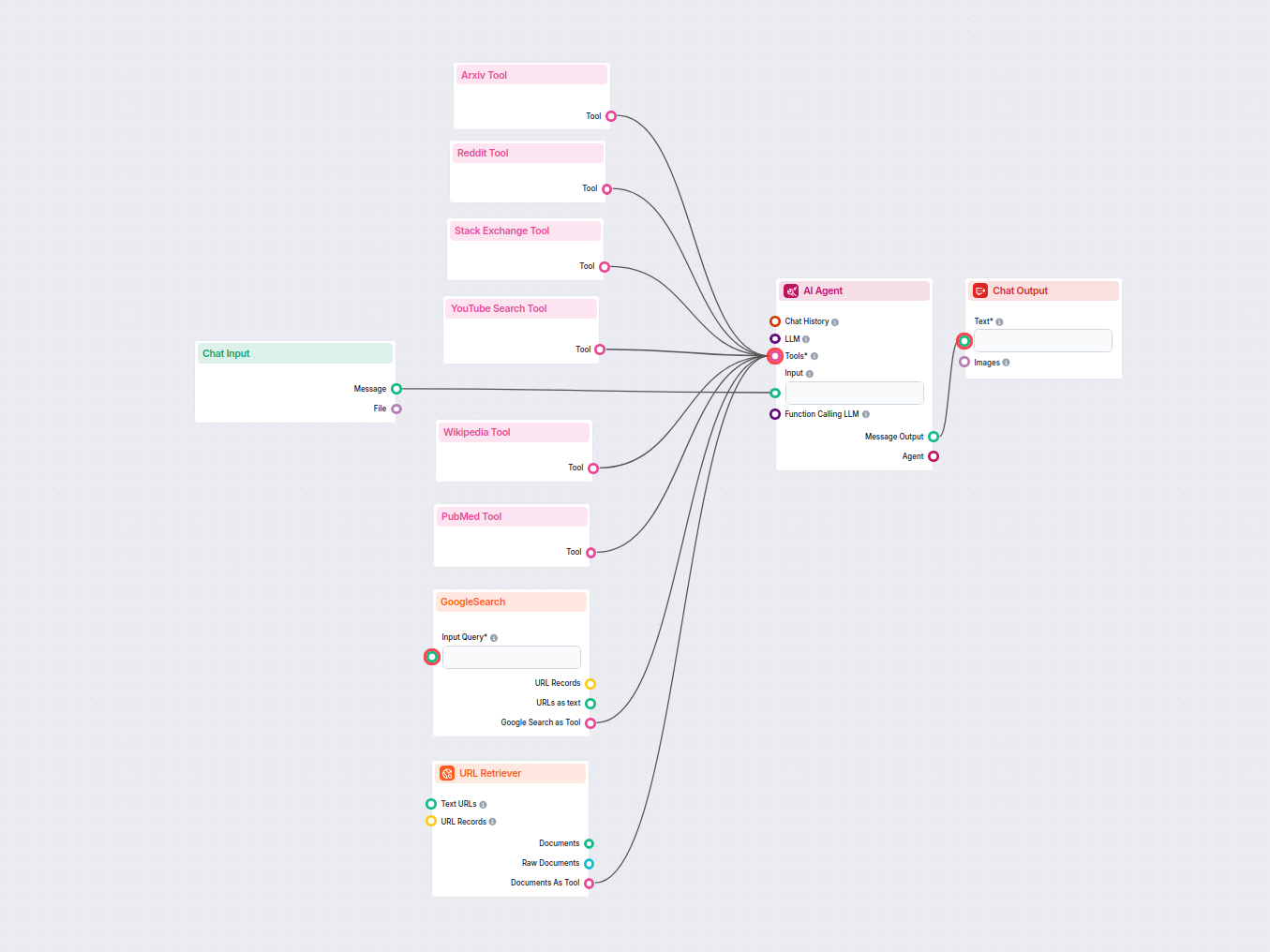
AI Chatbot z wyszukiwaniem w czasie rzeczywistym w Internecie i bazach wiedzy
Zaawansowany chatbot AI, który odpowiada na pytania użytkowników w czasie rzeczywistym, pozyskując i syntetyzując informacje z Google, Reddit, Wikipedii, Arxiv,...

Narzędzie PubMed od FlowHunt pozwala rozmawiać z AI o ponad 37 milionach cytowań biomedycznych z PubMed, oferując zwięzłe podsumowania badań i łatwy dostęp do literatury naukowej.
Opis komponentu
You can finally trust AI with your research thanks to a direct and up-to-date link to PubMed. With the help of AI Agents, you can effortlessly chat with over 37 million biomedical citations. The Agent searches the PubMed database to match your query and provides you with concise responses.
The PubMed Tool component lets you chat with millions of reputable biomedical articles. This way, you can turn hours of looking for the right sources into a quick chat. Based on your choices, it can either return articles from the PubMed database, along with a short description and a link, or piece together information from various entries.
Remember that PubMed is a database that links to the articles but doesn’t contain their full versions. That’s why FlowHunt can only access publicly available information on PubMed, such as the abstracts and authors.
While the component’s JSON definition includes some configurable fields, most are advanced and intended for internal or agent use:
| Input Name | Type | Description |
|---|---|---|
| tool_description | String | (Advanced) Helps the agent understand the tool’s purpose and usage. |
| tool_name | String | (Advanced) The reference name for the tool when used by an agent. |
| verbose | Boolean | (Advanced) Enables verbose output for debugging or detailed logs. |
These inputs are generally set internally and are not required for basic use. They provide flexibility for advanced users customizing agent behaviors or debugging.
The main output of the PubMed component is:
| Output Name | Type | Description |
|---|---|---|
| tool | Tool | The configured PubMed search tool instance, ready for use by an AI agent. |
This component works with an autonomous AI agent. AI Agents are computer programs that can perform tasks and make decisions independently. The Agents observe their environment and take action based on their unique programming, knowledge, and goals.
If you need more information, simply ask the bot. It’s just like chatting with a knowledgeable friend. It will get deeper into the topic, combining various articles or seamlessly switching to other related topics.
Let’s create a basic PubMed Chabot. Thanks to the use of an AI Agent, the Flow is super simple and contains just a few components:
Steps:
Feel free to experiment and expand the Flow. You can add more search tools and Knowledge Retrievers to make the bot a true information powerhouse. Play around with the Agent’s goal and backstory to achieve your desired output.
Note: If you want the Chatbot to link sources, simply add this requirement to the Agent’s goal.
Let’s say you’re trying to find out what’s new in brain cancer research:
The Chatbot will return a couple of recently trending articles on the topic. You can specify how many you want in the chat or simply ask it to give you more options. To get more information about an entry, simply ask about it or follow the link.
What happens if there isn’t a PubMed entry that matches your query? The Chatbot lets you know about it instead of hallucinating an answer. Let’s test it. Let’s ask the PubMed Chatbot about an SEO SaaS it shouldn’t know anything about.
When the Agent can’t find any suitable PubMed articles, it apologizes and prompts you to search the web for your query instead:
Aby pomóc Ci szybko zacząć, przygotowaliśmy kilka przykładowych szablonów przepływu, które pokazują, jak efektywnie używać komponentu Narzędzie PubMed. Te szablony prezentują różne przypadki użycia i najlepsze praktyki, ułatwiając zrozumienie i implementację komponentu w Twoich własnych projektach.
Zaawansowany chatbot AI, który odpowiada na pytania użytkowników w czasie rzeczywistym, pozyskując i syntetyzując informacje z Google, Reddit, Wikipedii, Arxiv,...
Narzędzie PubMed pozwala rozmawiać z AI o ponad 37 milionach renomowanych artykułów biomedycznych z PubMed, dostarczając zwięzłe podsumowania i bezpośrednie linki do źródeł.
Wykorzystuje autonomicznych Agentów AI do przeszukiwania bazy PubMed, dopasowując zapytania i dostarczając podsumowane odpowiedzi. Możesz poprosić o artykuły, podsumowania lub głębszą eksplorację tematów.
Nie, narzędzie zapewnia dostęp do publicznie dostępnych informacji, takich jak streszczenia i dane autorów. Dostęp do pełnych tekstów zależy od ich dostępności w PubMed.
Tak, można je łatwo dodać do przepływów FlowHunt, umożliwiając usprawnione badania i interakcje z chatbotem w ramach własnych przepływów AI.
Agent AI poinformuje Cię, że nie znaleziono pasujących artykułów, unikając zmyślonych odpowiedzi, i może zasugerować wyszukiwanie w internecie w celu uzyskania dodatkowych informacji.
Bezproblemowo uzyskuj dostęp, podsumowuj i eksploruj badania biomedyczne dzięki czatowi opartemu na AI. Doświadcz usprawnionego wyszukiwania wiedzy z FlowHunt.
Dowiedz się, jak stworzyć medycznego chatbota z AI, korzystając z narzędzia PubMed od FlowHunt. Ten kompleksowy przewodnik obejmuje konfigurację ścieżki badawcz...
Bez wysiłku rozmawiaj z dowolną stroną Wikipedii dzięki Agentom AI FlowHunt. Otrzymuj zwięzłe podsumowania, linki do źródeł i zamieniaj godziny badań w interakt...
Bez wysiłku rozmawiaj z dowolnym wątkiem na Reddicie dzięki Agentom AI FlowHunt. Natychmiast podsumowuj dyskusje, otrzymuj linki do źródeł i eksploruj tematy be...






